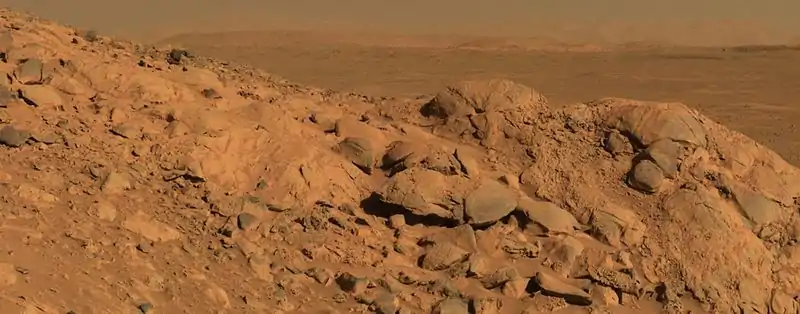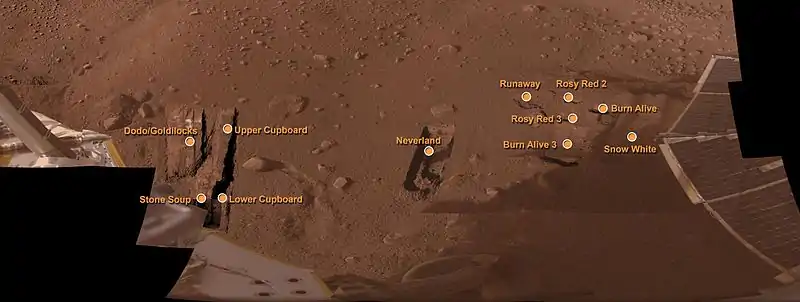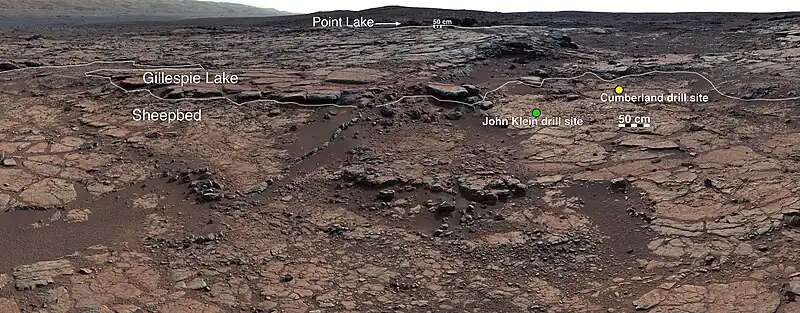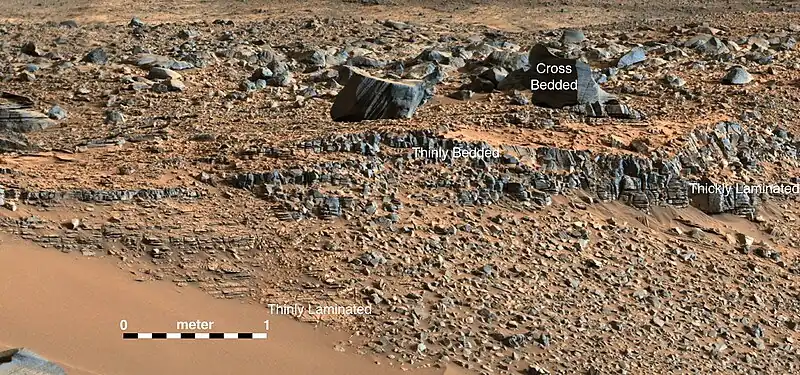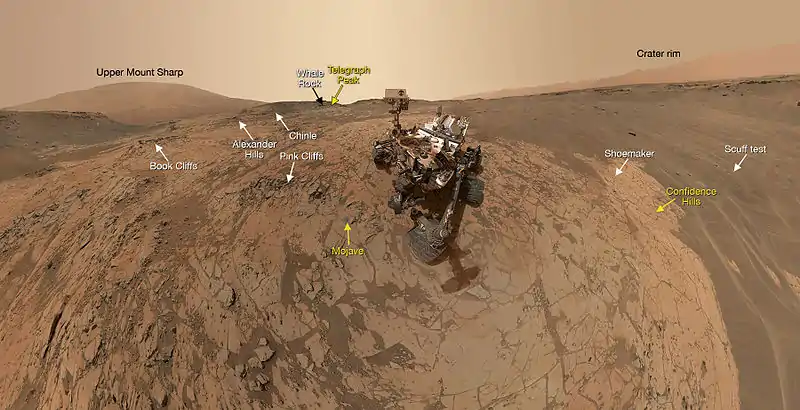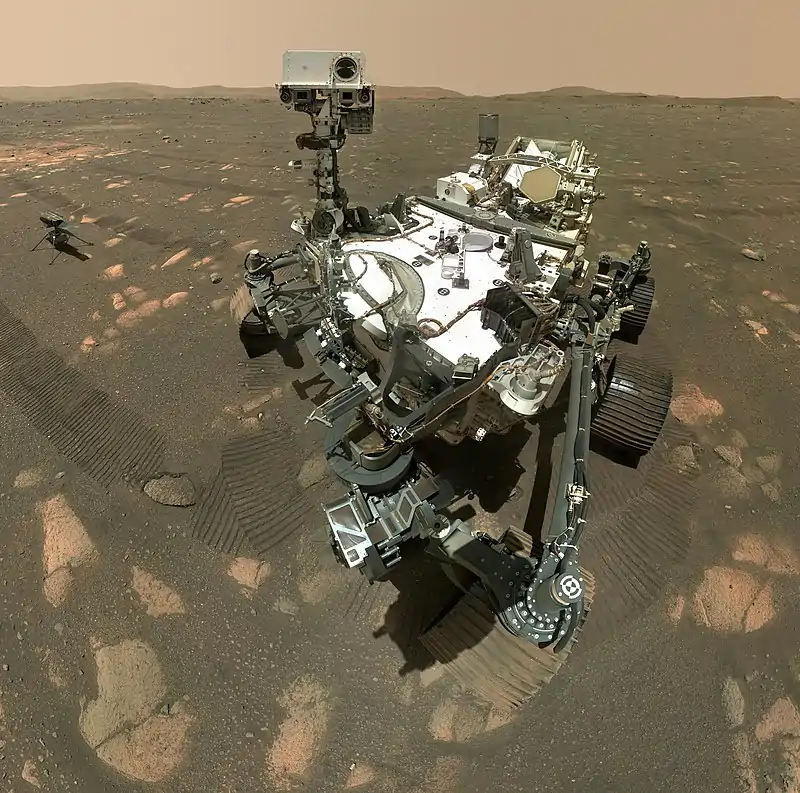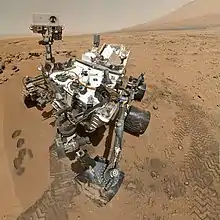This is an alphabetical list of named rocks (and meteorites) found on Mars, by mission. This list is a sampling of rocks viewed, and is not an exhaustive listing. A more complete listing may be found on the various NASA mission web sites. This listing does not include Martian meteorites found on Earth.
Names for Mars rocks are largely unofficial designations used for ease of discussion purposes, as the International Astronomical Union's official Martian naming system declares that objects smaller than 100 m (330 ft) are not to be given official names. Because of this, some less significant rocks seen in photos returned by Mars rovers have been named more than once, and others have even had their names changed later due to conflicts or even matters of opinion. Often rocks are named after the children or family members of astronauts or NASA employees. The name Jazzy, for example, was taken from a girl named Jazzy who grew up in Grand Junction, Colorado, USA. Her father worked for NASA and contributed to the findings and naming of the rocks.
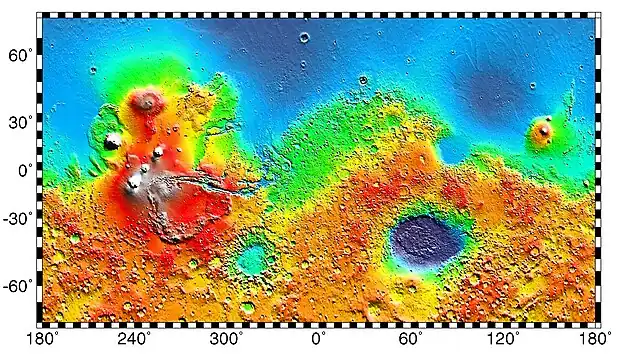
1976 – Viking program: Viking 1 and Viking 2 landers
Viking 1 Lander – July 20, 1976; Last Earth Contact – November 13, 1982.[1][2]
Viking 1 was operational on Mars for 2245 sols (2307 days; 6 years, 116 days).
Mars landing coordinates: 22°29′N 49°58′W / 22.48°N 49.97°W[1]
- Bashful
- Big Joe
- Delta
- Dopey
- Grumpy
- Metate 1
- Metate 2
- Midas Muffler
- Patch
- Sleepy
- Sponge
- Whale
Viking 2 Lander – September 3, 1976; Last Earth Contact – April 11, 1980.[1][3]
Viking 2 was operational on Mars for 1281 sols (1316 days; 3 years, 221 days).
Mars landing coordinates: 47°58′N 225°44′W / 47.97°N 225.74°W[1]
(Raw Images - Camera/Sol and 1-JPL and 2-JPL + NASA Image Viewer.)
- Bonneville
- Centaur
- Doc
- Happy
- Icl
- Mr. Badger
- Mr. Mole
- Mr. Rat
- Mr. Toad
- Notch
- Other
- Plymouth
- Sneezy
- Snow White
- Titan
 Big Joe rock on Mars – viewed by the Viking 1 Lander (February 11, 1978).
Big Joe rock on Mars – viewed by the Viking 1 Lander (February 11, 1978).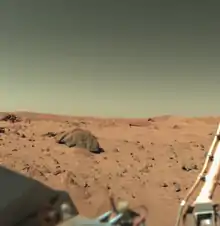 Big Joe rock on Mars – viewed by the Viking 1 Lander (February 11, 1978).
Big Joe rock on Mars – viewed by the Viking 1 Lander (February 11, 1978).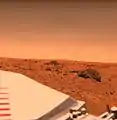 Big Joe rock on Mars – viewed by the Viking 1 Lander.
Big Joe rock on Mars – viewed by the Viking 1 Lander.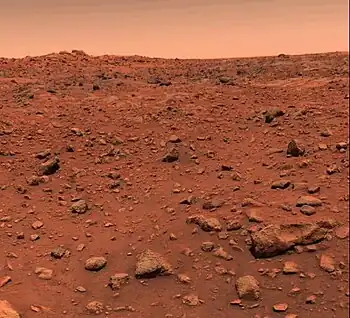 Rocks on Mars – viewed by the Viking 1 Lander (July 21, 1976).
Rocks on Mars – viewed by the Viking 1 Lander (July 21, 1976).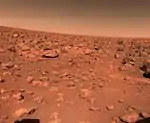 Rocks on Mars – viewed by the Viking 2 Lander (September 5, 1976).
Rocks on Mars – viewed by the Viking 2 Lander (September 5, 1976).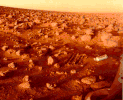 Rocks on Mars – viewed by the Viking 2 Lander (September 25, 1977).
Rocks on Mars – viewed by the Viking 2 Lander (September 25, 1977).
1997 – Sojourner rover (Mars Pathfinder)
Sojourner rover – July 4, 1997; Last Earth Contact – September 27, 1997.[4]
Sojourner was operational on Mars for 92 sols (95 days; 95 days).
Mars landing coordinates: 19°7′48″N 33°13′12″W / 19.13000°N 33.22000°W
(Raw Images - 1-Camera/Sol and 2-Camera/Sol and 3-Camera/Sol and 1-JPL and 2-JPL + NASA Image Viewer.)
- Anthill
- Auto
- Baby Otter
- Bama
- Bambam
- Barnacle Bill
- Barsoom
- Basket
- Bebob
- Blackhawk
- Book Shelf
- Booboo
- Bosco
- Boyle
- Brak
- Brick
- Broken Wall
- Bug
- Bullwinkle
- Bunky
- Cabbage Patch
- Calvin
- Cardiac Hill
- Casper
- Chimp
- Clumk
- Contour
- Couch
- Cradle
- Darth Vader
- Desert Princess
- Dilbert
- Dilbert's Boss
- Dogbert
- Dragon
- Duck
- Elvis
- Ender
- Flat Top
- Flipper
- Flute Top
- Frog
- Froggy
- Garfield
- Garibaldi
- Garrak
- Geordi
- Ginger
- Goldilocks
- Goose
- Gosling
- Grandma
- Grizzly
- Grommit
- Gumby
- Half Dome
- Hamster
- Hardstop
- Hassock
- Hedgehog
- Hero
- Hippo
- Hobbs
- Homer
- Hoppy
- Iggie
- Iguana
- Indiana Jones
- Jailhouse
- Janeway
- Jazzy
- Jedi
- Jimmy Cricket
- Kitten
- Lamb
- Landon
- Little Flat Top
- Longhorn
- Lookout
- Lozenge
- Lumpy
- Lunchbox
- Mafalda
- Marvin the Martian
- Matterhorn
- Mesa
- Mini
- Mint Julep
- Moe
- Mohawk
- Mouse
- Mr. Mole
- Nibbles
- Nigel
- Obelisk
- Otter
- Pancake
- Paz
- Penguin
- Picnic
- Piglet
- Pinky
- Pinocchio
- Piper
- Platypus
- Pokey
- Poohbear
- Poptart
- Potato
- Pumpkin
- Pyramid
- Pyramid Point
- Ratbert
- Ren
- Rocky
- Rolling Stone
- Rye Bread
- Sandworm
- Sardine
- Sassafras
- Scooby Doo
- Scout
- Seawolf
- Shaggy
- Shark
- Simba
- Sisyphus
- Smidgen
- Snoopy
- Snowy
- Snukums
- Souffle
- Squash
- Squeeze
- Space Ghost
- Spock
- Spud
- Stack
- Stimpy
- Stripe
- Stump
- Sulu
- T. Rex
- The Dice
- Tick
- Tigger
- Titus
- Torres
- Troll
- Trooper
- Turtle
- Tweak
- Valentine
- Warthog
- Wedge
- Woodie
- Yogi
- Zaphod
- Zorak
- Zucchini
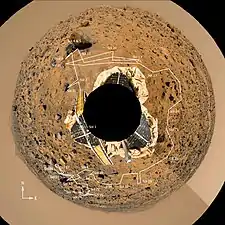 Rover Map of Sojourner's route on Mars (Sol 83, 1997) (Archive).
Rover Map of Sojourner's route on Mars (Sol 83, 1997) (Archive).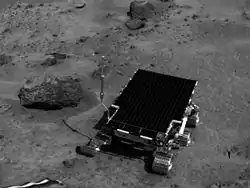 Barnacle Bill rock on Mars – near the Sojourner rover.
Barnacle Bill rock on Mars – near the Sojourner rover. Barnacle Bill rock on Mars - viewed by the Sojourner rover.
Barnacle Bill rock on Mars - viewed by the Sojourner rover.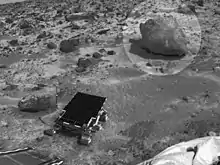 Yogi rock (circled) on Mars – near the Sojourner rover.
Yogi rock (circled) on Mars – near the Sojourner rover. Yogi rock on Mars – analyzed by the Sojourner rover.
Yogi rock on Mars – analyzed by the Sojourner rover. Yogi rock on Mars - viewed by the Sojourner rover.
Yogi rock on Mars - viewed by the Sojourner rover.
2004 – Spirit rover (MER-A)
Spirit Rover – January 4, 2004; Last Earth Contact – May 25, 2011.[5]
Spirit was operational on Mars for 2208 sols (2249 days; 6 years, 77 days).
Mars landing coordinates: 14°34′06″S 175°28′21″E / 14.5684°S 175.472636°E[6]
(Raw Images - Camera/Sol and JPL + NASA Image Viewer.)
- Aboa
- Adirondack
- Allan Hills (iron meteorite)
- Arctowski
- Belgrand
- Bread-Basket
- Casey Station
- Castilla
- ChanCheng
- Cheyenne
- Clovis
- Coba
- Cobra Hoods
- Concordia
- Davis
- Druzhnaya
- Ebenezer
- El Dorado
- Esperanza
- Faget (geological feature)
- Ferraz
- Garruchaga
- Gueslega
- Halley
- Home Plate (geological feature)
- Humphrey
- Juan Carlos
- Jubany
- King George Island
- Kohnen
- Korolev
- Macquarie
- Magic Carpet
- Marambio
- Mazatzal
- Melchior
- Mimi
- Molodezhnaya
- Montalva
- Oberth (geological feature)
- O Higgens
- Orcadas
- Pot of Gold
- Prat
- Primero
- Riquelme
- San Martin
- Sashimi
- Scott Base
- Sejong
- Signy
- Sobral
- Stone Council
- Sushi
- Tetl
- Tor
- Tyrone
- Vernadsky
- Vostok
- Wasa
- White Boat
- Wishstone
- Zhong Shan (iron meteorite)
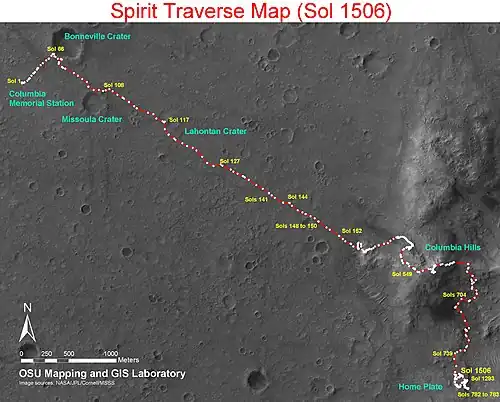 Rover Map of Spirit's route on Mars (Sol 1509, April 2, 2008) (Archive to Sol 2555, March 15, 2011 Current).
Rover Map of Spirit's route on Mars (Sol 1509, April 2, 2008) (Archive to Sol 2555, March 15, 2011 Current). "Adirondack" rock on Mars – viewed by the Spirit Rover.
"Adirondack" rock on Mars – viewed by the Spirit Rover. "Home Plate" rock outcrop on Mars – studied by the Spirit Rover.
"Home Plate" rock outcrop on Mars – studied by the Spirit Rover. "Mimi" rock on Mars – viewed by the Spirit rover.
"Mimi" rock on Mars – viewed by the Spirit rover. "Pot of Gold" rock on Mars – viewed by the Spirit rover.
"Pot of Gold" rock on Mars – viewed by the Spirit rover.
2004 – Opportunity rover (MER-B)
Opportunity rover – January 25, 2004; Last Earth Contact June 10, 2018.[7][8]
Opportunity was operational on Mars for 5110 sols (5250 days; 14 years, 136 days).
Mars landing coordinates: 1°56′46″S 354°28′24″E / 1.9462°S 354.4734°E[6]
(Raw Images - Camera/Sol and JPL + NASA Image Viewer.)
- Amboy
- Berry Bowl
- Baltra
- Block Island (iron meteorite)
- "Blueberries"
- Bounce
- Bylot
- Carousel
- Chapeco
- Cheyenne
- Chocolate Hills
- Cookies N Cream
- Diamond Jenness
- Earhart
- El Capitan
- Edmund
- Ellesmere
- Escher
- Esperance[9]
- Flatrock
- Florianopolis
- Guadalupe
- Heat Shield (iron meteorite)
- Homestake (vein)
- Igreja
- Ice Cream
- Joacaba
- Jornada del Muerto
- Joseph McCoy
- Kalavrita
- Kettlestone
- Kirkwood
- Lamination
- Last Chance
- Lion Stone
- Mackinac Island (iron meteorite)
- Marquette Island
- McKittrick
- Meridiani Planum (iron meteorite)
- Oileán Ruaidh (iron meteorite)
- Palemop
- Pilbara
- Pinnacle Island
- Puffin
- Pyrrho
- Razorback
- Santa Catarina
- Sarah
- Sergeant Charles Floyd
- Shark Pellets
- Shark's Tooth
- Shelter Island (iron meteorite)
- Shoemaker
- Slick
- Snout
- "Sparkling Spheres"
- SpongeBob SquarePants
- Steffers
- Stone Mountain
- Tennessee
- The Outcrop
- Tipuna
- Tubarao
- Videira
- Wave Ripple
- Whitewater River
- Wopmay
- Xanxer
- Yuri
 Rover Map of Opportunity's route on Mars (Sol 2055, January 24, 2009) (Archive to Sol 3342, June 21, 2013 Current).
Rover Map of Opportunity's route on Mars (Sol 2055, January 24, 2009) (Archive to Sol 3342, June 21, 2013 Current). "Block Island" meteorite on Mars – viewed by the Opportunity rover (July 31, 2009).
"Block Island" meteorite on Mars – viewed by the Opportunity rover (July 31, 2009). "Blueberries" (hematite spheres) on rock outcrop at Eagle Crater – viewed by the Opportunity rover (Sol 46 – March, 2004).
"Blueberries" (hematite spheres) on rock outcrop at Eagle Crater – viewed by the Opportunity rover (Sol 46 – March, 2004).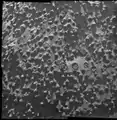 "Blueberries" at "Kirkwood" near Endeavour Crater – Opportunity rover (September 6, 2012).
"Blueberries" at "Kirkwood" near Endeavour Crater – Opportunity rover (September 6, 2012).
 "El Capitan" rock outcrop on Mars – studied by the Opportunity rover.
"El Capitan" rock outcrop on Mars – studied by the Opportunity rover. "El Capitan" rock outcrop on Mars – studied by the Opportunity rover.
"El Capitan" rock outcrop on Mars – studied by the Opportunity rover.
 "Heat Shield" meteorite (officially, Meridiani Planum meteorite) on Mars – viewed by the Opportunity rover (January 6, 2005).
"Heat Shield" meteorite (officially, Meridiani Planum meteorite) on Mars – viewed by the Opportunity rover (January 6, 2005). "Homestake" vein on Mars – viewed by the Opportunity rover (November 12, 2012).
"Homestake" vein on Mars – viewed by the Opportunity rover (November 12, 2012). "Jornada del Muerto" – rock found in Perseverance Valley (posted June 4, 2019).
"Jornada del Muerto" – rock found in Perseverance Valley (posted June 4, 2019). "Last Chance" rock outcrop on Mars – viewed by the Opportunity rover.
"Last Chance" rock outcrop on Mars – viewed by the Opportunity rover. "Mackinac Island" meteorite on Mars – viewed by the Opportunity rover (October 13, 2009).
"Mackinac Island" meteorite on Mars – viewed by the Opportunity rover (October 13, 2009)..jpg.webp) "Oileán Ruaidh" meteorite on Mars – viewed by the Opportunity rover (September 24, 2010).
"Oileán Ruaidh" meteorite on Mars – viewed by the Opportunity rover (September 24, 2010).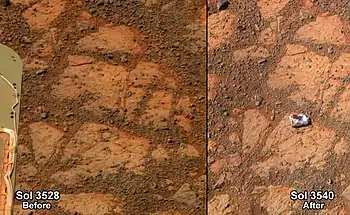

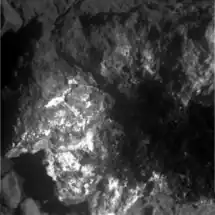
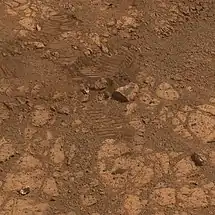 "Pinnacle Island" rock - location where rock was dislodged by Opportunity (February 4, 2014).
"Pinnacle Island" rock - location where rock was dislodged by Opportunity (February 4, 2014).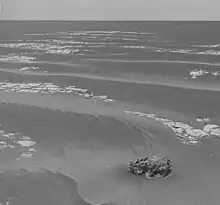 "Shelter Island" meteorite on Mars – viewed by the Opportunity Rover (October 3, 2009).
"Shelter Island" meteorite on Mars – viewed by the Opportunity Rover (October 3, 2009). "Shelter Island" meteorite on Mars – viewed by the Opportunity rover (October 1, 2009).
"Shelter Island" meteorite on Mars – viewed by the Opportunity rover (October 1, 2009).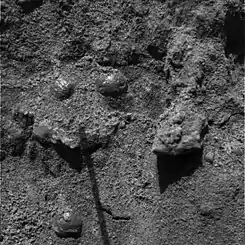 "Sparkling Spheres" embedded in trench wall at Meridiani Planum - viewed by the Opportunity rover (February, 2004).
"Sparkling Spheres" embedded in trench wall at Meridiani Planum - viewed by the Opportunity rover (February, 2004).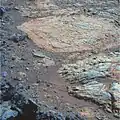 "Whitewater River" rock on Mars – viewed by the Opportunity rover (November 12, 2012).
"Whitewater River" rock on Mars – viewed by the Opportunity rover (November 12, 2012).
2008 – Phoenix lander
Phoenix lander – May 25, 2008; Green Valley, Vastitas Borealis − Last Earth Contact – November 10, 2008.[12]
Phoenix was operational on Mars for 157 sols (161 days; 161 days).
Mars landing coordinates: 68°13′N 125°42′W / 68.22°N 125.7°W (68°13′11.9994″N 125°42′0″W / 68.219999833°N 125.70000°W)
(Raw Images - Camera/Sol and JPL + NASA Image Viewer.)
- Baby Bear
- Burn Alive
- Burn Alive 3
- Dodo
- Goldilocks
- Lower Cupboard
- Mama Bear
- Neverland
- Papa Bear
- Rosy Red 2
- Rosy Red 3
- Runaway
- Snow White
- Stone Soup
- Upper Cupboard
2012 – Curiosity rover (Mars Science Laboratory)
Curiosity rover – August 6, 2012; Gale crater; CURRENTLY ACTIVE.[13]
As of January 14, 2024, Curiosity has been active for 4066 sols (4178 total days; 11 years, 161 days).
Mars landing coordinates: 4°35′22″S 137°26′30″E / 4.5895°S 137.4417°E (4°35′22.2″S 137°26′30.1194″E / 4.589500°S 137.441699833°E)
(Raw Images - Camera and Sol and 1-JPL and 2-JPL + NASA Image Viewer.)
- Alexander Hills (area)
- Amargosa Valley (area)
- Bathurst Inlet
- Bonanza King
- Book Cliffs (area)
- Buckskin
- Burwash
- Chinle (area)
- Confidence Hills (area)
- Coronation
- Crest
- Crestaurum
- Cumberland
- Darwin Outcrop
- Dingo Gap (area)
- Discovery Ridge (area)
- Egg Rock (meteorite)
- Ekwir_1
- Et-Then
- Flower-like rock
- Garden City (area)
- Gator-Back Rocks
- Gillespie (area)
- Gillespie Lake
- Glenelg (area)
- Goulburn
- Harrison
- Hidden Valley (area)
- High Dune (area)
- Hottah
- Ithaca
- Jake Matijevic
- John Klein-A/B/C
- Kimberley (area)
- Knorr[14]
- Lamoose
- Lebanon (iron meteorite)
- Link
- Little Colonsay
- Marker Band (area)
- Missoula
- Mojave (area)
- Mojave 2
- Murray Unit (area)
- Namib Dune (area)
- Not Bones
- Nova
- Old Soaker
- Pahrump Hills (area)
- Panorama Point (area)
- Pink Cliffs (area)
- Point Lake (area)
- Portage[15]
- Rapitan
- Rocknest (area)
- Rocknest 3[16]
- Sayunei
- Selwyn
- Sequoia
- Shaler[17][18]
- Sheepbed
- Shoemaker
- Snake River[19]
- Stimson unit (area)
- Strathdon
- Sutton Inlier (area)[14]
- Telegraph Peak (area)
- Terra Firme (book-like rock)
- Tintina[14][20]
- Twin Cairns Island (area)
- Unnamed-20120902
- Unnamed-20180102
- Vera Rubin Ridge (area)
- Waypoint 1 (area)
- Wernecke[14]
- Whale
- Whimsical
- Wildrose
- Windjana
- Winnipesaukee
- Yellowjacket
- Yellowknife Bay (area)
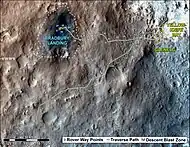 First-Year and first-mile Traverse Map of the Curiosity rover on Mars (August 1, 2013; 3-D).
First-Year and first-mile Traverse Map of the Curiosity rover on Mars (August 1, 2013; 3-D). "Alexander Hills" bedrock on Mars - viewed by Curiosity (November 23, 2014).
"Alexander Hills" bedrock on Mars - viewed by Curiosity (November 23, 2014). "Bathurst Inlet" rock on Mars – as viewed by the MAHLI camera on the Curiosity rover (September 30, 2012).
"Bathurst Inlet" rock on Mars – as viewed by the MAHLI camera on the Curiosity rover (September 30, 2012).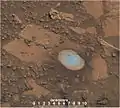 "Bonanza King" rock on Mars - dusted and initially drilled (September 11, 2014).
"Bonanza King" rock on Mars - dusted and initially drilled (September 11, 2014).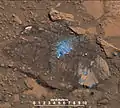 "Bonanza King" rock on Mars - drilling stopped due to loose rock (September 11, 2014).
"Bonanza King" rock on Mars - drilling stopped due to loose rock (September 11, 2014). "Buckskin" rock on Mars – Curiosity drilling site
"Buckskin" rock on Mars – Curiosity drilling site
(July 30, 2015). "Burwash" rock on Mars – as viewed by the MAHLI camera on the Curiosity rover (October 29, 2012).
"Burwash" rock on Mars – as viewed by the MAHLI camera on the Curiosity rover (October 29, 2012).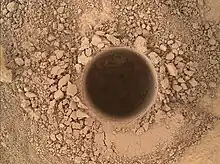 "Confidence Hills" rock on Mars - Curiosity's first target at Mount Sharp (September 24, 2014).
"Confidence Hills" rock on Mars - Curiosity's first target at Mount Sharp (September 24, 2014). "Coronation" rock on Mars – first target of the ChemCam laser analyzer on the Curiosity rover (August 17, 2012).
"Coronation" rock on Mars – first target of the ChemCam laser analyzer on the Curiosity rover (August 17, 2012). "Coronation" rock on Mars – close-up - viewed by the Curiosity rover (August 17, 2012).
"Coronation" rock on Mars – close-up - viewed by the Curiosity rover (August 17, 2012).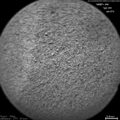 "Crestaurum" sand patch on Mars – before/after ChemCam laser hits – as viewed by Curiosity (October 20, 2012).
"Crestaurum" sand patch on Mars – before/after ChemCam laser hits – as viewed by Curiosity (October 20, 2012).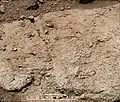 "Cumberland" bedrock on Mars - Curiosity's second drilling site (Yellowknife Bay; February 19, 2013; white balanced).
"Cumberland" bedrock on Mars - Curiosity's second drilling site (Yellowknife Bay; February 19, 2013; white balanced).
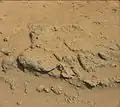 "Darwin" rock outcrop on Mars - viewed by Curiosity (Waypoint 1; September 10, 2013; overview).
"Darwin" rock outcrop on Mars - viewed by Curiosity (Waypoint 1; September 10, 2013; overview). "Darwin" rock outcrop ridge - viewed by Curiosity (Waypoint1; September 21, 2013; context).
"Darwin" rock outcrop ridge - viewed by Curiosity (Waypoint1; September 21, 2013; context). "Darwin" sandstone on Mars - viewed by the Curiosity rover (Waypoint 1; September 21, 2013; closeup).
"Darwin" sandstone on Mars - viewed by the Curiosity rover (Waypoint 1; September 21, 2013; closeup).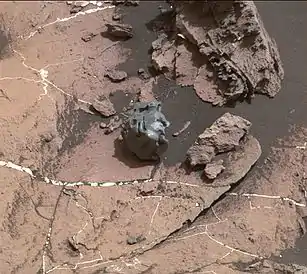
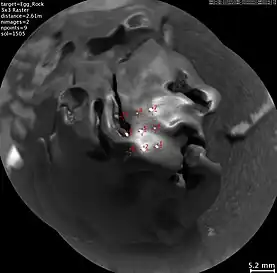
 "Ekwir_1" rock on Mars – cleaned with Curiosity's "Dust Removal Tool" (DRT) (January 6, 2013; closeup).
"Ekwir_1" rock on Mars – cleaned with Curiosity's "Dust Removal Tool" (DRT) (January 6, 2013; closeup).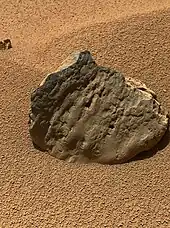 "Et-Then" rock on Mars – as viewed by the MAHLI camera on the Curiosity rover (October 29, 2012).
"Et-Then" rock on Mars – as viewed by the MAHLI camera on the Curiosity rover (October 29, 2012). "Flower"-like rock – as viewed by the Curiosity rover (February 24, 2022)
"Flower"-like rock – as viewed by the Curiosity rover (February 24, 2022) "Garden City" rock – as viewed by the Curiosity rover (March 18, 2015).
"Garden City" rock – as viewed by the Curiosity rover (March 18, 2015).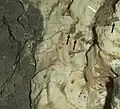 "Garden City" rock − closeup – as viewed by the MAHLI camera on the Curiosity rover (March 2, 2015).
"Garden City" rock − closeup – as viewed by the MAHLI camera on the Curiosity rover (March 2, 2015). "Gator-Back" rocks − closeup as viewed by the Curiosity rover (March 15, 2022).
"Gator-Back" rocks − closeup as viewed by the Curiosity rover (March 15, 2022). "Gillespie Lake" rock texture – as viewed by the MAHLI camera on the Curiosity rover (December 19, 2012).
"Gillespie Lake" rock texture – as viewed by the MAHLI camera on the Curiosity rover (December 19, 2012).
 "Goulburn" rock outcrop on Mars – close-up viewed by Curiosity (August 17, 2012).
"Goulburn" rock outcrop on Mars – close-up viewed by Curiosity (August 17, 2012).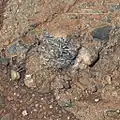 "Harrison" rock (and crystals) on Mars – viewed by the Curiosity rover (January 15, 2014).
"Harrison" rock (and crystals) on Mars – viewed by the Curiosity rover (January 15, 2014).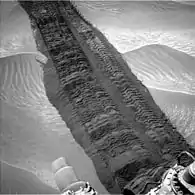 "Hidden Valley" sand - Curiosity's tracks (August 4, 2014).
"Hidden Valley" sand - Curiosity's tracks (August 4, 2014). "Hidden Valley" water-related sedimentary deposits on Mars – Curiosity rover (August 7, 2014).
"Hidden Valley" water-related sedimentary deposits on Mars – Curiosity rover (August 7, 2014). "High Dune" sand (undisturbed) on Mars – Curiosity rover (December 5, 2015).
"High Dune" sand (undisturbed) on Mars – Curiosity rover (December 5, 2015). "Hottah" rock outcrop on Mars – ancient streambed viewed by Curiosity (September 12, 2012; closeup; 3-D).
"Hottah" rock outcrop on Mars – ancient streambed viewed by Curiosity (September 12, 2012; closeup; 3-D). "Ithaca" rock on Mars – target of the ChemCam laser analyzer on Curiosity (October 30, 2013; closeup).
"Ithaca" rock on Mars – target of the ChemCam laser analyzer on Curiosity (October 30, 2013; closeup)..jpg.webp) "Jake Matijevic" rock on Mars – a prime test target of the Curiosity rover (September 19, 2012).
"Jake Matijevic" rock on Mars – a prime test target of the Curiosity rover (September 19, 2012).

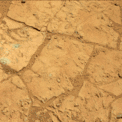
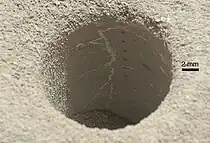 "John Klein" mudstone - drill hole (1.6 cm (0.63 in)) made by Curiosity (Yellowknife Bay; May 10, 2013).
"John Klein" mudstone - drill hole (1.6 cm (0.63 in)) made by Curiosity (Yellowknife Bay; May 10, 2013).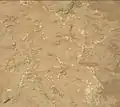
 "Lamoose" rock (high silica levels) – viewed by Curiosity (July 11, 2015).
"Lamoose" rock (high silica levels) – viewed by Curiosity (July 11, 2015). "Lebanon" meteorite on Mars – viewed by Curiosity (May 25, 2014).
"Lebanon" meteorite on Mars – viewed by Curiosity (May 25, 2014)..jpg.webp)
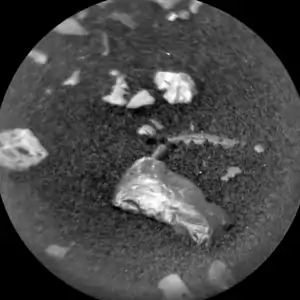 "Little Colonsay" possible meteorite – viewed by Curiosity (November 26, 2018).
"Little Colonsay" possible meteorite – viewed by Curiosity (November 26, 2018).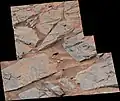 "Marker Band" area rhythmic layered rock (November 7, 2022).
"Marker Band" area rhythmic layered rock (November 7, 2022). "Missoula" rock outcrop on Mars – viewed by Curiosity (July 1, 2015).
"Missoula" rock outcrop on Mars – viewed by Curiosity (July 1, 2015). "Missoula" rock outcrop – "Buckskin" drilling site (July 1, 2015).
"Missoula" rock outcrop – "Buckskin" drilling site (July 1, 2015). "Mojave 2" rock on Mars – drilling site - viewed by Curiosity (December 31, 2015).
"Mojave 2" rock on Mars – drilling site - viewed by Curiosity (December 31, 2015). "Murray Unit" sandstone nodules – viewed by Curiosity (March 9, 2016).
"Murray Unit" sandstone nodules – viewed by Curiosity (March 9, 2016). "Namib Dune" sand on Mars (at night) – (Curiosity rover; January 22, 2016).
"Namib Dune" sand on Mars (at night) – (Curiosity rover; January 22, 2016).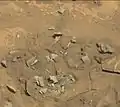 "Not Bones" on Mars - viewed by Curiosity (August 21, 2014).
"Not Bones" on Mars - viewed by Curiosity (August 21, 2014). "Nova" rock on Mars – 1st laser spark imaged (Curiosity rover; July 12, 2014; video (01:07)).
"Nova" rock on Mars – 1st laser spark imaged (Curiosity rover; July 12, 2014; video (01:07)). "Nova" rock on Mars – ChemCam spectra (Curiosity rover; July 12, 2014).
"Nova" rock on Mars – ChemCam spectra (Curiosity rover; July 12, 2014).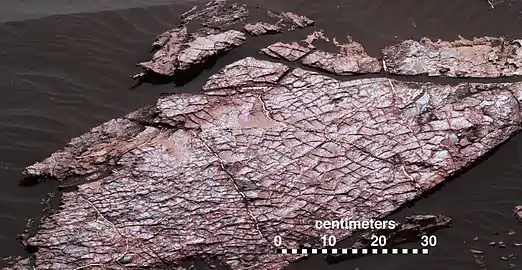 "Old Soaker" rock slab on Mars – Possible mud cracks (Curiosity rover; December 20, 2016).
"Old Soaker" rock slab on Mars – Possible mud cracks (Curiosity rover; December 20, 2016). "Pahrump Hills" rock outcrop on Mars – viewed by Curiosity (September 23, 2014).
"Pahrump Hills" rock outcrop on Mars – viewed by Curiosity (September 23, 2014). "Pahrump Hills" bedrock on Mars - viewed by Curiosity (November 9, 2014).
"Pahrump Hills" bedrock on Mars - viewed by Curiosity (November 9, 2014).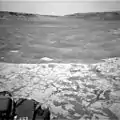 "Pahrump Hills" sand - viewed by Curiosity (November 13, 2014).
"Pahrump Hills" sand - viewed by Curiosity (November 13, 2014). "Pahrump Hills" sand - Curiosity's tracks (November 7, 2014).
"Pahrump Hills" sand - Curiosity's tracks (November 7, 2014). "Pink Cliffs" rock outcrop on Mars - viewed by Curiosity (October 7, 2014).
"Pink Cliffs" rock outcrop on Mars - viewed by Curiosity (October 7, 2014). "Point Lake" rock outcrop (detail) on Mars – viewed by Curiosity (June 13, 2013; context).
"Point Lake" rock outcrop (detail) on Mars – viewed by Curiosity (June 13, 2013; context).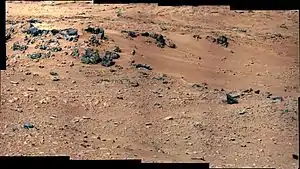

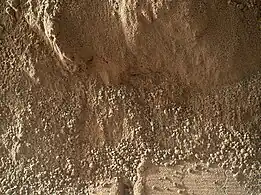

 Sand tracks – uncover finer grains (Curiosity rover; December 3, 2015).
Sand tracks – uncover finer grains (Curiosity rover; December 3, 2015). "Rocknest 3" rock on Mars – as viewed by the MastCam on Curiosity (October 5, 2012).
"Rocknest 3" rock on Mars – as viewed by the MastCam on Curiosity (October 5, 2012).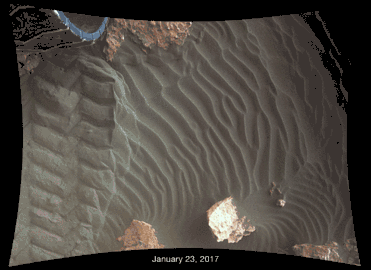 Sand moving on Mars – as viewed by Curiosity (January 23, 2017).
Sand moving on Mars – as viewed by Curiosity (January 23, 2017). "Sayunei" rock on Mars – Curiosity's view at night (January 22, 2013; wh light).
"Sayunei" rock on Mars – Curiosity's view at night (January 22, 2013; wh light). "Sayunei" rock on Mars – Curiosity's view at night (January 22, 2013; uv light).
"Sayunei" rock on Mars – Curiosity's view at night (January 22, 2013; uv light).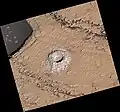 "Sequoia" rock on Mars − drilled hole made by Curiosity (October 26, 2023)
"Sequoia" rock on Mars − drilled hole made by Curiosity (October 26, 2023) "Shaler" rock outcrop on Mars – as viewed by the MastCam on the Curiosity rover (December 7, 2012).
"Shaler" rock outcrop on Mars – as viewed by the MastCam on the Curiosity rover (December 7, 2012). "Sheepbed" rock outcrop on Mars – as viewed by the MastCam on Curiosity (December 13, 2012).
"Sheepbed" rock outcrop on Mars – as viewed by the MastCam on Curiosity (December 13, 2012). "Snake River" rock feature on Mars – as viewed by Curiosity (December 20, 2012).[19]
"Snake River" rock feature on Mars – as viewed by Curiosity (December 20, 2012).[19]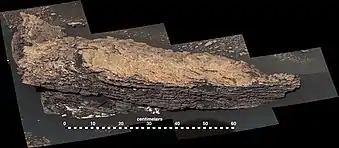 "Strathdon" rock on Mars – viewed by the Curiosity rover (July 9, 2019).
"Strathdon" rock on Mars – viewed by the Curiosity rover (July 9, 2019).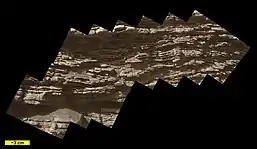 "Strathdon-closeup" rock on Mars – viewed by the Curiosity rover (July 10, 2019).
"Strathdon-closeup" rock on Mars – viewed by the Curiosity rover (July 10, 2019).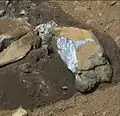 "Sutton Inlier" rock on Mars – broken by the Curiosity rover (January 31, 2013).[14]
"Sutton Inlier" rock on Mars – broken by the Curiosity rover (January 31, 2013).[14]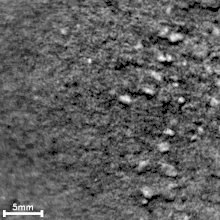
 "Terra Firme" book-like rock (April 15, 2023)
"Terra Firme" book-like rock (April 15, 2023)
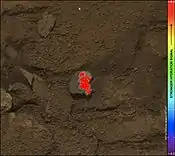
 "Unnamed-20120902" rock on Mars – as viewed by the Curiosity rover (September 2, 2012).
"Unnamed-20120902" rock on Mars – as viewed by the Curiosity rover (September 2, 2012).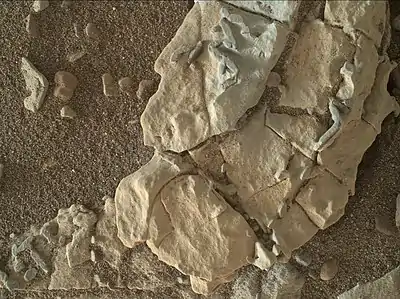 "Unnamed-20180102" curious rock shapes (bio or geo?) on Mars – as viewed by Curiosity (January 2, 2018).[24][25]
"Unnamed-20180102" curious rock shapes (bio or geo?) on Mars – as viewed by Curiosity (January 2, 2018).[24][25] "Unnamed-20180305" curious rock shapes (bio or geo?) on Mars – as viewed by Curiosity (March 5, 2018).[26][27]
"Unnamed-20180305" curious rock shapes (bio or geo?) on Mars – as viewed by Curiosity (March 5, 2018).[26][27] "Wernecke" rock on Mars – cleaned with Curiosity's "Dust Removal Tool" (DRT) (January 26, 2013).[14]
"Wernecke" rock on Mars – cleaned with Curiosity's "Dust Removal Tool" (DRT) (January 26, 2013).[14] "Whale" rock on Mars - cross-bedding due to passage of water - as viewed by Curiosity (November 2, 2014).
"Whale" rock on Mars - cross-bedding due to passage of water - as viewed by Curiosity (November 2, 2014).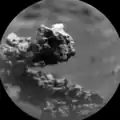 "Whimsical" rock on Mars as viewed from the Curiosity rover (July 27, 2021).
"Whimsical" rock on Mars as viewed from the Curiosity rover (July 27, 2021). "Windjana" sandstone on Mars - as viewed by the Curiosity rover (Kimberley; April 23, 2014; context).
"Windjana" sandstone on Mars - as viewed by the Curiosity rover (Kimberley; April 23, 2014; context). "Windjana" sandstone on Mars - drill hole (1.6 cm (0.63 in)) made by Curiosity (Kimberley; April 29, 2014).
"Windjana" sandstone on Mars - drill hole (1.6 cm (0.63 in)) made by Curiosity (Kimberley; April 29, 2014).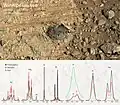 "Winnipesaukee" rock on Mars - target of the ChemCam laser analyzer on Curiosity (June 8, 2014).
"Winnipesaukee" rock on Mars - target of the ChemCam laser analyzer on Curiosity (June 8, 2014).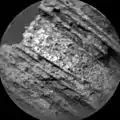 "Yellowjacket" rock on Mars – as viewed by the Curiosity rover (May 15, 2015).
"Yellowjacket" rock on Mars – as viewed by the Curiosity rover (May 15, 2015).




2018 – InSight lander
InSight lander – May 8, 2018; Elysium Planitia; CURRENTLY ACTIVE.
As of January 14, 2024, InSight has been active for 1825 sols (1875 days; 5 years, 49 days).
Mars landing coordinates: 4°30′09″N 135°37′24″E / 4.5024°N 135.6234°E (4°30′8.6394″N 135°37′24.24″E / 4.502399833°N 135.6234000°E)
(Raw Images - NASA and JPL + NASA Image Viewer.)
2021 – Perseverance rover (Mars 2020)
Perseverance rover – February 18, 2021; Jezero crater; CURRENTLY ACTIVE.
As of January 14, 2024, Perseverance has been active for 1031 sols (1060 total days; 2 years, 330 days).
Mars landing coordinates: 18°26′41″N 77°27′03″E / 18.4447°N 77.4508°E (18°26′40.92″N 77°27′2.88″E / 18.4447000°N 77.4508000°E)
(Raw Images - Camera and Sol and 1-JPL + 2-JPL + 3-JPL + NASA Image Viewer.)
- Landing Site (area)
- AEGIS_0442B rock
- Artuby outcrop (area)
- "Boulder field"
- Brac rock
- Cine rock
- "Crater Floor Fractured Rough" (area)
- Delta sediment (area)
- Dourbes rock
- Faillefeu rock
- First borehole (Roubion)
- Foux rock
- Garde rock
- Intriguing rocks
- Máaz – 1st study target
- Máaz rock
- Odd rock
- Otis Peak rock
- "Paver rocks"
- Rochette rock
- SnakeHead rock
- Wind-carved rock
- Yeehgo rock
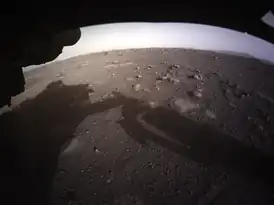 First color image
First color image
(February 18, 2021) Delta sediment
Delta sediment
(February 22, 2021) Máaz - 1st study target
Máaz - 1st study target
(February 22, 2021) Wind-carved rock
Wind-carved rock
(February 24, 2021)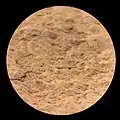 Máaz rock
Máaz rock
(March 2, 2021) Yeehgo rock
Yeehgo rock
(March 7, 2021) Odd rock
Odd rock
(March 28, 2021) Intriguing rocks
Intriguing rocks
(April 27, 2021)- Focus test (video; 0:05)
(May 10, 2021) 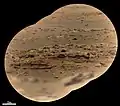 Artuby outcrop
Artuby outcrop
(June 17, 2021) Examining "paver rocks"
Examining "paver rocks"
(July 10, 2021) Foux rock
Foux rock
(July 11, 2021) First borehole (Roubion)
First borehole (Roubion)
(August 7, 2021)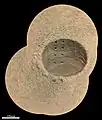 Rubion laser holes
Rubion laser holes
(August 8, 2021) Rochette rock
Rochette rock
(August 26, 2021)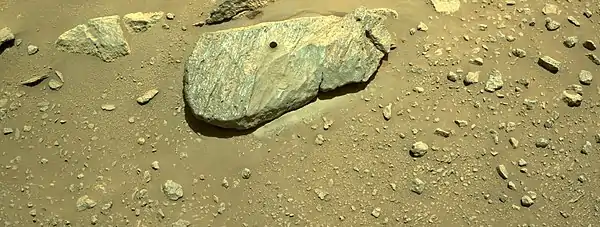 Rochette rock borehole
Rochette rock borehole
(September 1, 2021).gif) Rochette rock boreholes
Rochette rock boreholes
(September 10, 2021) Faillefeu rock
Faillefeu rock
(September 4, 2021) Cine Rock
Cine Rock
(September 17, 2021) Garde rock-SHERLOC
Garde rock-SHERLOC
(September 18,2021) Garde rock-SHERLOC
Garde rock-SHERLOC
(September 18, 2021) Dourbes rock-WATSON
Dourbes rock-WATSON
(November 5, 2021) Dourbes rock-PIXL
Dourbes rock-PIXL
(November 5, 2021) Brac rock
Brac rock
(November 15, 2021)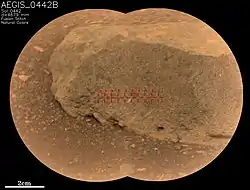 "AEGIS_0442B" rock (May 18, 2022)
"AEGIS_0442B" rock (May 18, 2022) SnakeHead rock
SnakeHead rock
(June 12, 2022)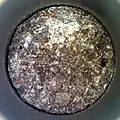 Otis Peak sample
Otis Peak sample
(June 12, 2023) Boulder field
Boulder field
(July 6, 2023) Cored Rock sample collection at 1000 sols
Cored Rock sample collection at 1000 sols
(December 12, 2023)
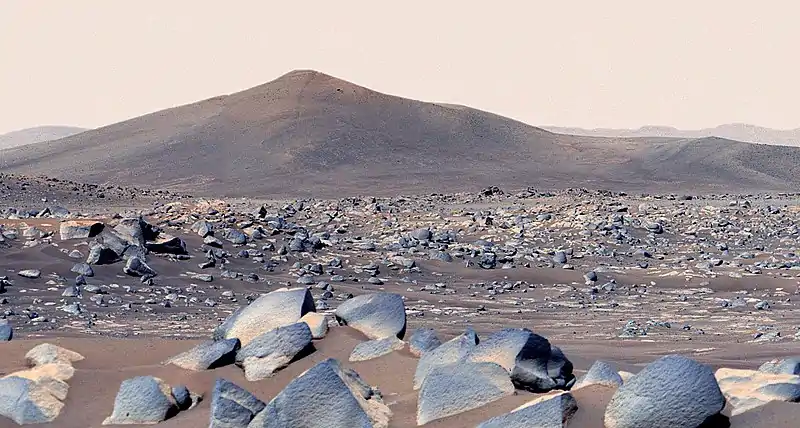
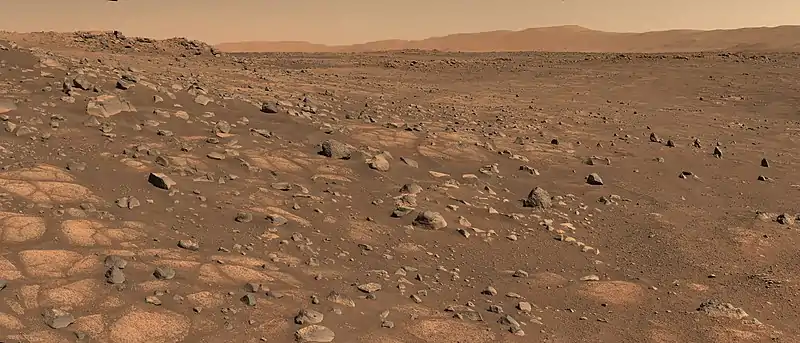
.jpg.webp)
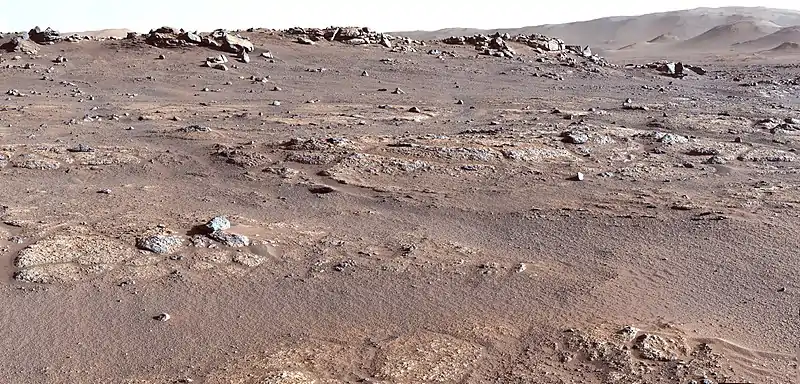


Other rock formations
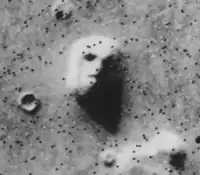 "Face on Mars" – due to Sun's lighting (Viking 1 orbiter; July 25, 1976)
"Face on Mars" – due to Sun's lighting (Viking 1 orbiter; July 25, 1976)
(40°45′N 9°28′W / 40.75°N 9.46°W). "Bear Face on Mars" viewed from MROrbiter
"Bear Face on Mars" viewed from MROrbiter
(January 31, 2023)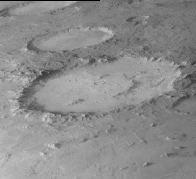

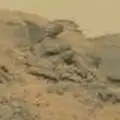
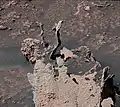 "Finger"-like rocks (Curiosity rover; May 17, 2022)
"Finger"-like rocks (Curiosity rover; May 17, 2022) "Book"-like rock ("Terra Firme") (Curiosity rover; April 15, 2023)
"Book"-like rock ("Terra Firme") (Curiosity rover; April 15, 2023).jpg.webp) "Doughnut"-shaped rock (Perseverance rover; June 22, 2023).
"Doughnut"-shaped rock (Perseverance rover; June 22, 2023)..jpg.webp) "Hollowed-Out" rock (Perseverance rover; June 26, 2023).
"Hollowed-Out" rock (Perseverance rover; June 26, 2023).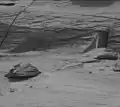 "Door"-like structure (Curiosity rover; May 7, 2022).
"Door"-like structure (Curiosity rover; May 7, 2022).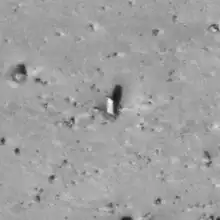 "Monolith" on Mars – rectangular boulder (MRO; July 24, 2008)
"Monolith" on Mars – rectangular boulder (MRO; July 24, 2008)
(7°13′52″S 267°21′00″E / 7.231°S 267.350°E). Oblong boulder on Mars – lands upright after rolling down a hill (MRO; July 3, 2014)
Oblong boulder on Mars – lands upright after rolling down a hill (MRO; July 3, 2014)
(31°S 302°E / 31°S 302°E).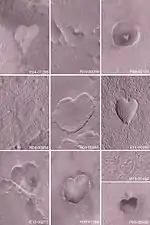
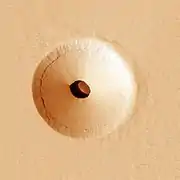 Mars hole near Pavonis Mons.
Mars hole near Pavonis Mons. Collapse pit
Collapse pit
(December 28, 2020)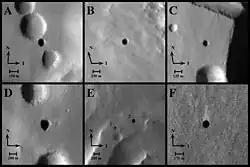 Cave entrances (possible) on Mars (2001 Mars Odyssey; September 24, 2007).
Cave entrances (possible) on Mars (2001 Mars Odyssey; September 24, 2007).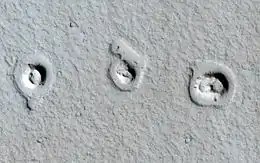 Rootless cones on Mars – due to lava flows interacting with water (MRO; January 4, 2013)
Rootless cones on Mars – due to lava flows interacting with water (MRO; January 4, 2013)
(21°57′54″N 197°48′25″E / 21.965°N 197.807°E). Mars blue dunes
Mars blue dunes
(April 12, 2021). Mars sand dune ripples (August 12, 2020).
Mars sand dune ripples (August 12, 2020).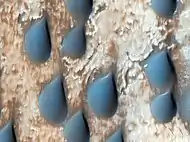 Copernicus crater - olivine sand dune terrain.
Copernicus crater - olivine sand dune terrain. Sand dunes on Mars during springtime in the Northern Hemisphere.
Sand dunes on Mars during springtime in the Northern Hemisphere. Unusual circular (no frost) sand dunes on Mars.
Unusual circular (no frost) sand dunes on Mars.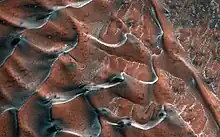 Mars frosty sand dunes
Mars frosty sand dunes
(March 22, 2021). Polygonal patterns highlighted by carbon dioxide frost.
Polygonal patterns highlighted by carbon dioxide frost. Dust deposits-transverse aeolian ridges (TARs)-Syria Planum.
Dust deposits-transverse aeolian ridges (TARs)-Syria Planum. Dust tower on Mars between Olympus Mons and Valles Marineris.
Dust tower on Mars between Olympus Mons and Valles Marineris. Scallop landforms (March 22, 2021).
Scallop landforms (March 22, 2021).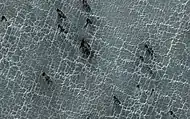 Spider-like terrain on Mars.
Spider-like terrain on Mars. Mars ridges
Mars ridges
(March 22, 2021).
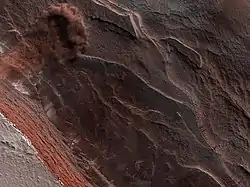
See also
- Chemical gardening – Demonstration of metallic salts crystallization
- Composition of Mars – Branch of the geology of Mars
- Geology of Mars – Scientific study of the surface, crust, and interior of the planet Mars
- Formation of rocks – Process of rock formations
- List of craters on Mars
- List of minerals
- List of mountains on Mars
- List of quadrangles on Mars
- List of rock formations
- List of rock types
- List of valles on Mars
- Martian soil – Fine regolith found on the surface of Mars
- Mineralogy of Mars
- Planetary nomenclature – System of uniquely identifying features on the surface of a planet or natural satellite
- Rock cycle – Transitional concept of geologic time
- Water on Mars – Study of past and present water on Mars
References
- 1 2 3 4 Williams, David R. Dr. (December 18, 2006). "Viking Mission to Mars". NASA. Retrieved February 2, 2014.
- ↑ Nelson, Jon. "Viking 1". NASA. Retrieved February 2, 2014.
- ↑ Nelson, Jon. "Viking 2". NASA. Retrieved February 2, 2014.
- ↑ Nelson, Jon. "Mars Pathfinder / Sojourner Rover". NASA. Retrieved February 2, 2014.
- ↑ Nelson, Jon. "Mars Exploration Rover - Spirit". NASA. Retrieved February 2, 2014.
- 1 2 Staff. "Mapping the Mars Rovers' Landing Sites". Esri. Retrieved May 4, 2014.
- ↑ Agle, DC; Brown, Dwayne; Wendel, JoAnna (13 February 2019). "NASA's Opportunity Rover Mission on Mars Comes to End". NASA. Retrieved 14 February 2019.
- ↑ Nelson, Jon. "Mars Exploration Rover - Opportunity". NASA. Retrieved February 2, 2014.
- ↑ Chang, Kenneth (7 June 2013). "Martian Rock Another Clue to a Once Water-Rich Planet". New York Times. Retrieved 7 June 2013.
- 1 2 3 O'Neill, Ian (January 17, 2014). "Mystery Rock 'Appears' in Front of Mars Rover". Space.com. Retrieved January 18, 2014.
- 1 2 3 Chang, Kenneth (January 24, 2014). "Mars Rover Marks an Unexpected Anniversary With a Mysterious Discovery". New York Times. Retrieved January 24, 2014.
- ↑ Nelson, Jon. "Phoenix". NASA. Retrieved February 2, 2014.
- ↑ Nelson, Jon. "Mars Science Laboratory Curiosity Rover". NASA. Retrieved February 2, 2014.
- 1 2 3 4 5 6 7 8 9 Webster, Guy; Brown, Dwayne (March 18, 2013). "Curiosity Mars Rover Sees Trend In Water Presence". NASA. Archived from the original on April 24, 2013. Retrieved March 20, 2013.
- ↑ Staff (December 3, 2012). "A Sampling of Martian Soils". NASA. Retrieved December 3, 2012.
- ↑ Staff (November 22, 2012). "Thanksgiving on Mars: Working Holiday for Curiosity Rover". Space.com. Retrieved November 22, 2012.
- ↑ Staff (December 11, 2012). "PIA16550: Layered Martian Outcrop 'Shaler' in 'Glenelg' Area". NASA. Retrieved December 12, 2012.
- ↑ Hoagland, Richard C. (December 4, 2012). "NASA Announces Curiosity Rover To Investigate Mysterious Linear Features, Called "Shaler"". Enterprise Mission. Archived from the original on April 16, 2013. Retrieved March 17, 2013.
- 1 2 Staff (January 4, 2013). "PIA16564: 'Snake River' Rock Feature Viewed by Curiosity Mars Rover". NASA. Retrieved January 4, 2013.
- 1 2 3 Rincon, Paul (March 19, 2013). "Curiosity breaks rock to reveal dazzling white interior". BBC. Retrieved March 19, 2013.
- 1 2 Webster, Guy; Brown, Dwayne; Cantillo, Laurie (November 2, 2016). "Curiosity Mars Rover Checks Odd-looking Iron Meteorite". NASA. Retrieved November 2, 2016.
- ↑ Anderson, Paul Scott (February 3, 2013). "Curiosity 'hammers' a rock and completes first drilling tests". The Meridiani Journal. Archived from the original on February 6, 2013. Retrieved February 3, 2013.
- ↑ Brown, Dwayne (October 30, 2012). "NASA Rover's First Soil Studies Help Fingerprint Martian Minerals". NASA. Retrieved October 31, 2012.
- ↑ David, Leonard (January 5, 2018). "Structures on Mars". Space.com. Retrieved January 5, 2018.
- ↑ Edwards, Christopher (January 3, 2018). "Sols 1913-1924: Curiosity's Working Holiday". NASA. Retrieved January 6, 2018.
- ↑ Adamson, Allan (March 5, 2018). "Scientist May Have Found Evidence Of Fossilized Alien Tracks On Planet Mars". TechTimes.com. Retrieved March 5, 2018.
- ↑ Howell, Elizabeth (March 6, 2018). "No, Those Aren't Animal Tracks on Mars". Space.com. Retrieved March 6, 2018.
- ↑ Kooser, Amanda (12 June 2019). "Star Trek on Mars: NASA spots Starfleet logo in dune footprint - Beam me down to Mars, Scotty". CNET. Retrieved 12 June 2019.
- ↑ Samson, Diane (16 June 2019). "William Shatner Takes Playful Jab At 'Star Wars' Over 'Starfleet' Symbol Found On Mars". TechTimes.com. Retrieved 16 June 2019.
- ↑ Speigel, Lee (October 19, 2015). "Buddha Statue (Or Rock Formation) Spotted On Mars". Huffington Post. Retrieved December 12, 2015.
External links
- Mars - Geologic Map (USGS, 2014) (original / crop / full / video (00:56)).
- Google Images: Rocks on Mars and Martian Rocks
- Rocks on Mars (Geology.com)
- MPF Rock Names
- Named Rocks on Mars (ppt file)
- NASA – Mars Exploration Program
- Understanding 35 weird objects on Mars
- The Origins of Life (Robert Hazen, NASA) (video, 38m, April 2014).
- Co-Evolution of Life and Rocks on YouTube (Robert Hazen, NASA) (video, 70m, July 2019).






